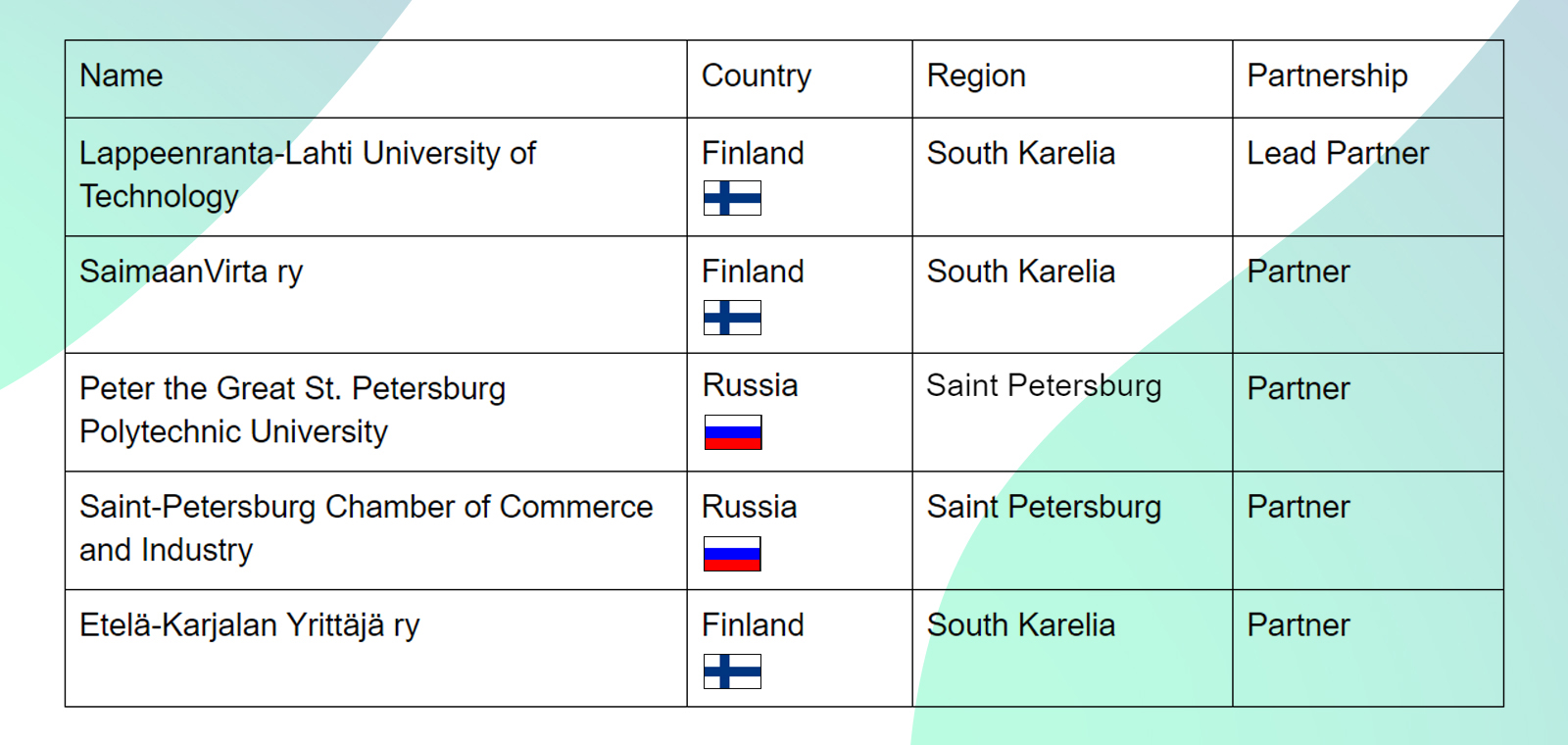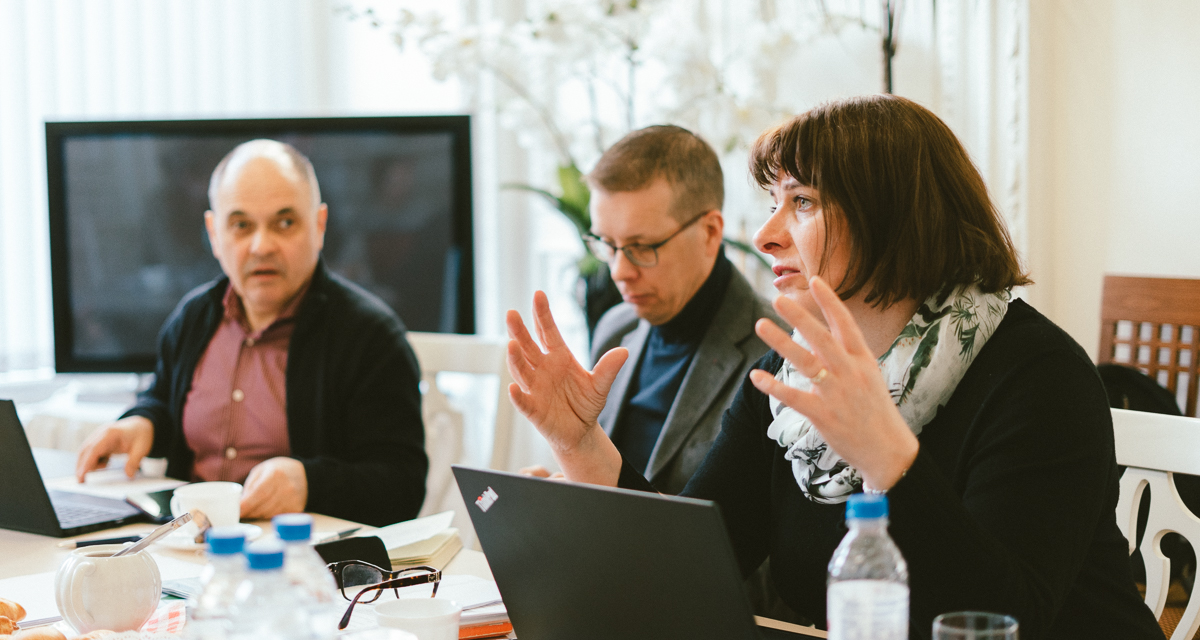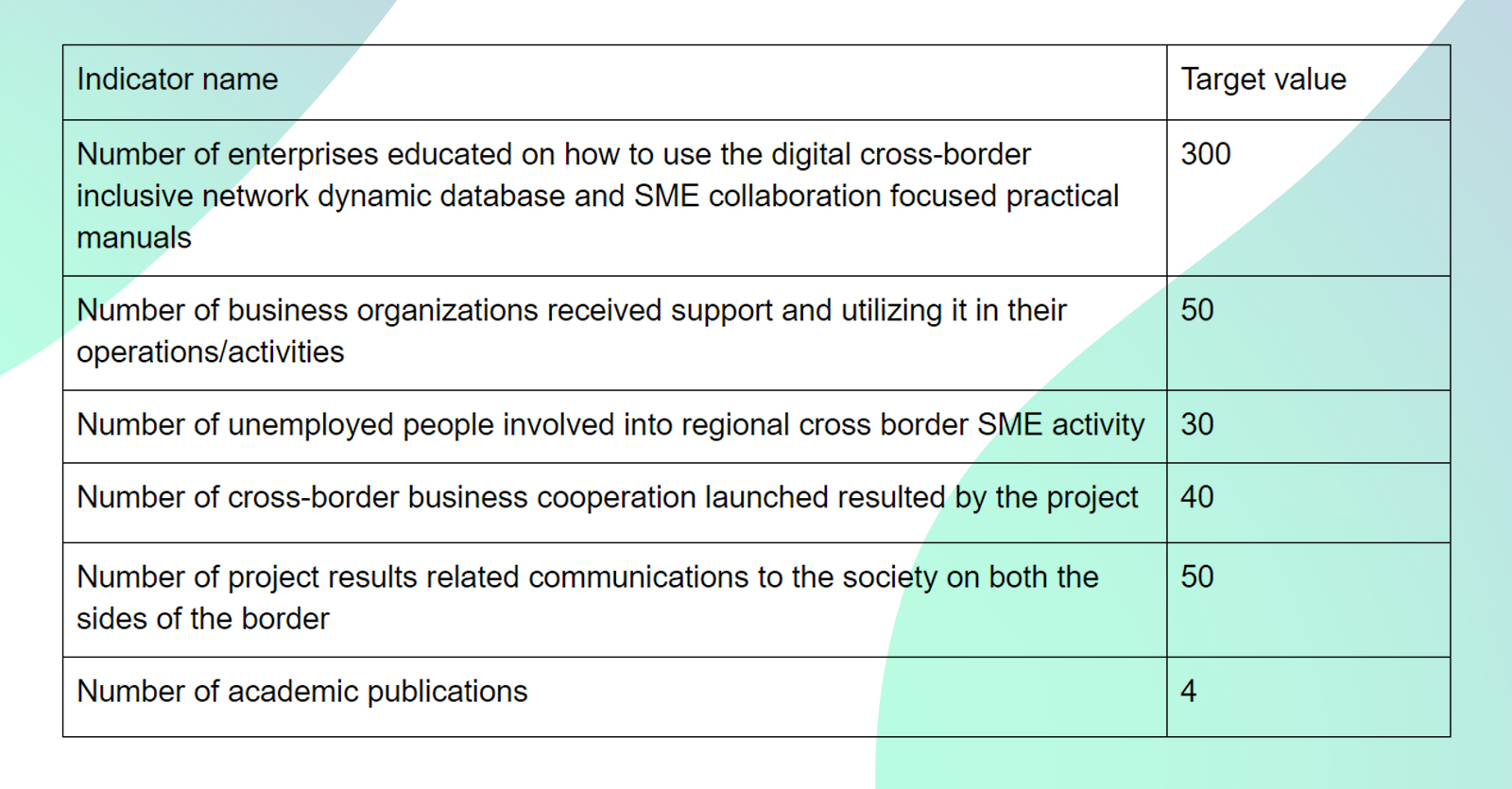 В чем секрет успешного сотрудничества между компаниями из России и Финляндии и других приграничных стран? На успешность совместной работы двух компаний влияет множество различных условий – местное законодательство, различия в интересах и корпоративной культуре и даже обычные сложности в коммуникации. Когда две компании разделены государственной границей, список подобных факторов увеличивается. Сложности могут возникнуть, из-за языкового и культурного барьера, таможенных ограничений и множества других условий. Изучению данного вопроса посвящен проект INCROBB “Открытые трансграничные деловые сети завтрашнего дня”.
В чем секрет успешного сотрудничества между компаниями из России и Финляндии и других приграничных стран? На успешность совместной работы двух компаний влияет множество различных условий – местное законодательство, различия в интересах и корпоративной культуре и даже обычные сложности в коммуникации. Когда две компании разделены государственной границей, список подобных факторов увеличивается. Сложности могут возникнуть, из-за языкового и культурного барьера, таможенных ограничений и множества других условий. Изучению данного вопроса посвящен проект INCROBB “Открытые трансграничные деловые сети завтрашнего дня”.
What is the key to successful cooperation? Fruitful collaboration can be undermined by a number of factors including differing interests and corporate culture, local regulations and even simple misunderstandings. When two companies are divided by a governmental border the range of possible obstacles only expands. Complications may be caused by a language barrier, cultural differences, export/import regulations and many other circumstances. Solving this question, researching and facilitating successful collaboration between cross-border SMEs (small and medium-sized enterprises) is the main goal of INCROBB "Inclusive cross-border business networking of tomorrow" project.
The project addresses the following problem areas:
1. Intensification of cross-border SME collaboration between South-East Finland and Saint Petersburg/ Leningradskaja oblast in various segments;
2. Creating a mechanism of involving unemployed people of the regions under consideration into SMEs activity in order to decrease unemployment rate and prevent labor force drain from the border regions;
3. Offering solutions on acceleration of crucial circular economy principals in the context of the regional SMEs cross-border activity.
The target groups of the project are:
1. SMEs of South-East Finland and Saint Petersburg/ Leningradskaja oblast;
2. Unemployed experts of the regions under coverage of the projects;
3. Regional authorities and non-governmental organizations.
The novelty of the offered approach is that there will be created a real-life replicable mechanism that is kept working after the project is over. A few project participants will continue supporting the cross- border SMEs and hidden experts by means of that mechanism usage. A new users of the project product could be easily trained as the product is replicable. The pilot case of the project apart of its main goal to learn by doing about opportunities of cross-border collaboration and hidden experts involvement deals with perspective of circular economy and renewable energy principals employment by cross-border SMEs.
Objective
Overall objective of the project
To attract businesses to invest, locate and operate in the programme area
Specific objective of the project
The objective of INCROBB is to develop and apply an innovative multi-level cross-border collaboration platform on sustainable SME business management and employment in the region.
This objective is promoted by 1) carrying out the surveys that aiming on obtaining the data on what is the demand of the regional SMEs on cross-border cooperation and what is the potential of the hidden expertise for intensification of the regional SMEs on cross-border cooperation, and 2) creating an approach for SMEs on how to overcome the barriers in cross-border cooperation by linking them with the “hidden expertise” through new forms of work, and 3) disseminating the knowledge gained during the project into the wider network of regional actors to identify regional problems and solve them through cross-border cooperation.
INCROBB aims to achieve these overall objectives through the following specific objectives:
1. Supporting regional SMEs from both the sides of the border by developing the access to the partner search technology on finding potential partners and (hidden) workforce/creative people;
2. Giving the SME’s the opportunity to access international markets as well as cooperate internationally by providing the pertained knowledge base;
3. Creating new jobs and job opportunities within target regions, thus, decrease intro-country migration and unemployment rate;
4. Offering a vehicle for hidden talents from both the sides of the border to realize themselves;
5. Disseminating the project results on various levels: local, national and international aiming at increased cross-border information exchange and cooperation.
The objectives of INCROBB are directed to filling the gaps in cooperation and knowledge for lively, active and competitive region. The successful implementation of these activities is ensured by participation of the best regional organizations and experts in the field. The proposed activities will promote the information exchange between decision makers and stake holders to increase crossborder cooperation among the SMEs, public organizations, and non-governmental organization in the region. However, cross-border SME business might develop and take a different path and INCROBB will take a role for developing cross-border collaboration vehicles and knowledge to benefit opportunities offered by digitalization and circular economy in the region.
Problem analysis
The Russian-Finnish cross-border collaboration of SMEs is currently not very intensive as it could be. In spite of various initiatives and programs that are run and have been run by different government and non-government organizations, there is a lack of common cross-border contacts as well as intercultural understanding at the both the sides of the border. In particular, the possibility of the crossborder collaboration in its essence is not very much understood. On the top of that are the language and cultural barriers, as well as difference in countries’ legislation. This situation is caused by the lack of cross-border communication, cooperation and education services in sustainable business management and business education at different levels. In addition, a common problem has been that the economic activities and results of the economic growth are concentrated around the largest cities and their surroundings, such as St. Petersburg and Helsinki regions.
Other regions, especially East and South-east Finland has not been able to benefit the opportunities offered by new technologies and economic growth. The local firms are moving their businesses to the fast developing and growing regions and individual experts are increasingly following the firms. The same kind of phenomenon can be seen in Russia. In North-West Russia, the most of the economic activities take place around the Saint Petersburg. In this process, the large firms play the central role attracting the best experts by offering better career opportunities. Even the fast growing SMEs are lacking of highly educated experts, especially international expertise. Therefore, in both side of the border, local SMEs experience the demand of expertise.
Recent developments in digital technology and circular economy has been opening new opportunities for SMEs. However, there still exist barriers to find experts, participate in wider business networks, and benefit from new opportunities offered by new technologies. Therefore, understanding the sphere of digital technology and circular economy opens new cross-border collaboration forms between SMEs and individual experts. Despite of differences, the regions of the both sides of the border face the same needs for cross-border cooperation to enhance growth of SMEs and employment of experts in the regions. Along with this micro-environment problem, comprehensive digitalization continuously leaves fewer chances for people to get a traditional working place as it used to be, for example, a decade ago. In addition, the emerging new innovative firms are challenging the existing forms of business and work. New firms born to be members of global network of actors, for example a global network of recycling materials.
Similarly, various people offer their ideas and expertise in multiple spaces. However, there exists a certain amount of high quality hidden expertise in the region that is not utilized by local firms and public organizations. The expertise is hidden, fragmented and individual level resource that is hidden and active behind the business surface. The community of those people could be called “hidden expertise”. They are young skillful unemployed people as well as degreeless and highly experienced unemployed experts in the region. Thus, there is a need for a common cross-border approach for enhancing the utilization of new forms of work for the organizations and individual experts in the region. SMEs and “hidden expertise” form high potentiality of working force that is not fully implemented in the regions of South Karelia, Leningradskaja oblast and Saint Petersburg. This situation in turn is caused by the lack of understanding of the fast changes happening in business environment and its consequences influencing the cross-border communication, cooperation and employment services at different levels. The digitalization and circular economy are taking their very first steps and it is important to be a part of this movement.
Partners

Key ideas
The intensity of cross border collaboration between SMEs of the South Karelia from one hand and Leningradskaja Oblast and Saint Petersburg from the other are not high despite of the numerous programs and initiatives that support those kind of activities. The high level of RUB-EURO exchange rate, cultural barriers, limited language skills of Russian and Finnish SME managers and owners, difference in legislation of the countries, as well as some other matters act as barriers in flourishing of such collaboration. Besides the mentioned micro-environment problem, comprehensive digitalization continuously leaves less and less chances for people to get a traditional working place as it used to be, for example, a decade ago. At the same time, new innovative firms challenge the existing forms of doing business and working behavior. Many of them are ‘born global’ with business ideas based on the proposition to be a member of global network of actors. Similarly, various people offer their ideas and expertise in multiple spaces. Within the same point in time they can be a part of the global expert community providing large-scale services for multinational corporations and they can act as individual entrepreneurs for a single local customer. The modern way of executing the working tasks often does not demand a formal working place. Numerous firms operate worldwide and their businesses are based upon global platforms. They use benefits of globalization for creating ideas and innovations as well as for developing expertise and for searching for the best partners. Those best partners do exist but it is not a big chance that a firm easily finds exactly one that it demands.

In this radically changing environment, the key aim of the project is to enhance the utilization of new forms of work for the SMEs and “hidden expertise” possessed by unemployed working force in the regions of South Karelia, Leningradskaja Oblast and Saint Petersburg. By hidden expertise we mean young skilful unemployed people as well as degreeless and highly experienced unemployed experts in the region. There exists a certain amount of high quality hidden expertise in the region that is not in use by local firms and public organizations. The expertise is hidden, fragmented and individual level resource that is hidden and active behind the business surface. They are single people and they are not shown on the business surface. At the same time, SMEs are lacking special skills and experts in number of fields that hamper their growth and internationalizations. Thus, there is a need for a common cross-border approach for enhancing the utilization of new forms of work for the organizations and individual experts in the region. In particular, SMEs and “hidden expertise” possessed by unemployed working force in the regions of South Karelia, Leningradskaja Oblast and Saint Petersburg. This situation in turn is caused by the lack of understanding on digitalization of business environments and its consequences to the cross-border communication, cooperation and employment services on different levels.
For this purpose, the project:
1) investigates the potential of internationalization of the regional (Finnish and Russian) SMEs;
2) suggests/develops a new approach that enhance the collaboration between SMEs and individual experts at both the regional and the cross-border levels;
3) analyzes a pilot case in the project that is one taken from the recycling industry.

Based on TyönVuoksi ry and IntoPajat ry pilot cases, the project aims at finding the new forms of cross-border cooperation between Finnish and Russian SMEs and individual experts that operate on re-cycling business. As a whole, the project is aiming at creating an approach for SMEs of the region to use the knowledge pertained to going globally as well as usage of hidden expertise in order to intensify their cross-border business activity. As a result of the project, the SMEs should be able to get a mechanism of finding partners to collaborate across the border as well as to use experts through the new forms of collaboration. At the same time, the regional expertise becomes part of the wider cross-border expert network.
The potential partners and the hidden expertise become available for international business through partner search technology. Hence, the developed knowledge based solution involves:
1. Supporting regional SMEs from both the sides of the border by developing the access to the partner search technology on finding potential partners and (hidden) workforce/creative people;
2. Giving the SMEs the opportunity to access international markets as well as cooperate internationally by providing the pertained knowledge base;
3. Creating new jobs and job opportunities within target regions, thus, decrease intro-country migration and unemployment rate;
4. Offering a vehicle for hidden expertise from both the sides of the border to realize themselves.
Finally, the project ensures dissemination of the project results on various levels: local, national and international organizing pilots, seminars, workshops, publications and other communication outputs such as website, press-releases, interviews with media to increase cross-border information exchange and cooperation among the participating organizations and in wider stakeholder networks.
Thematic indicators

Project specific indicators

Main project phases
1. Problem analysis and data collection carried out by the research teams of the Universities (LUT University and Peter the Great St. Petersburg Polytechnic University);
2. Based on the carried study a digital cross-border inclusive network dynamic data base for SMEs and unemployed experts of the region will be developed in order to support the mentioned actors to match efficient teams. Along with this data base the focused practical manual for cross-border collaboration in Russian and Finnish languages will be developed and offered to the SMEs involved in the project;
3. The developed approaches will be tested by cross-border pilot case that is based on operation of two SMEs (TyönVuoksi ry and IntoPajat ry) that based their business activities on the principals of recycle economy. The pilot will also deal with the problem of involving the hidden experts (unemployed people of the regions) into business life. It is assumed that pilot companies will increase business in order to increase impact on both the environment of the region by enlarging application of re-cycle economy principals and the unemployment situation in the region by offering more job opportunities. Thus, the principal “learning by doing” will be realized at this phase of the project;
4. Several of the project partners (Saint-Petersburg Chamber of Commerce and Industry, TyönVuoksi ry, and Etelä-Karjalan Yrittäjä ry) will obtain the shared project products ownership after the last is over. It is assumed that they will continue using the digital cross-border inclusive network dynamic data base for SMEs and the focused practical manual for cross-border collaboration to support the SMEs of the cross-border-region in the future. The project products will be designed in a way to be replicated if necessary;
5. All the results of the project will be actively communicated and disseminated.


